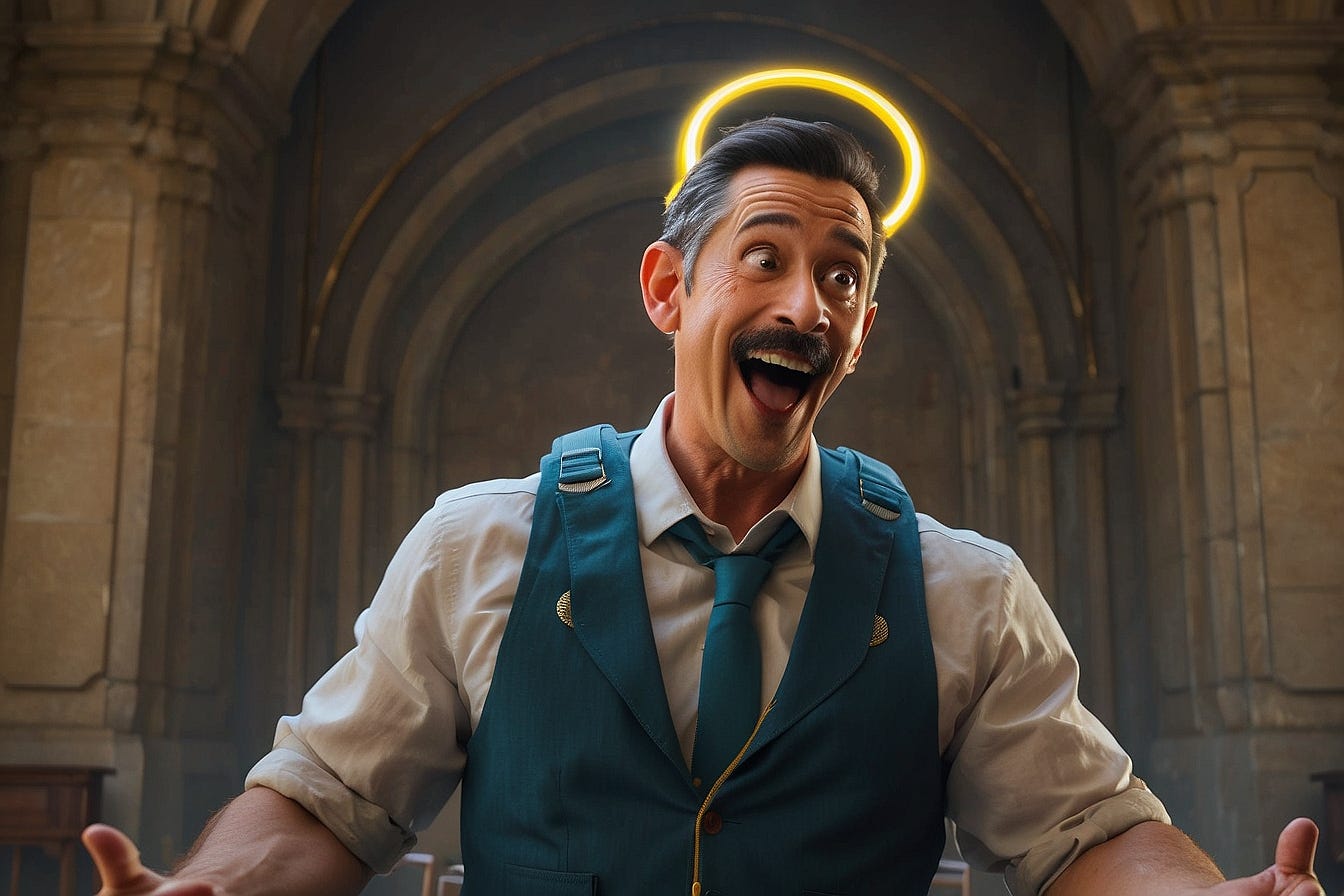
There’s a comedy on Netflix called The Good Place. It’s about people who die and think they’ve gone to heaven. But it’s a trick, and that’s part of the torture. As the series progresses, they discover that the afterlife is a balance sheet: your good deeds and bad deeds are tallied up, and the net result determines your fate. The problem is that no one is good enough to actually get into the good place.
Our culture does tell us that we can get to heaven through our own efforts. And I’m a nice guy. So yay, me! But a moment’s thought would lead many of us to realize that there’s a problem. Even Stalin and Hitler thought they were good people, fighting for justice. The mark of a sociopath is that he does bad things but has a clear conscience.
The part about no one being good enough to get to the good place on their own is an unintentionally Christian message, however. The Christian solution is grace. We can’t build a tower to heaven, but God did build a bridge to earth. God’s love for us—the crucifixion, death, and resurrection of Christ—means that we get what we don’t deserve.
Why, then, would anyone choose hell? Maybe for the same reason that some people choose to go to prison. You could object that no one ever sets a life goal of spending decades in the clinker. And you’d be right. Instead, someone chooses something else that they think is good, but which is not. A man might seek to punish a wrongdoer by killing him. He thinks this is justice and that he is entitled to this good. But he is mistaken, and life in prison is the consequence. He chose prison, but he might not see it that way.
Novelist and Daily Wire contributor Andrew Klavan writes in The Truth and Beauty that we find “meaning in collaboration with reality.” But if we “step outside of that collaboration” we “find ourselves left with nihilistic nonsense.”
A simple example is the familiar question, “If a tree falls in the forest and no one is around to hear it, does it still make a sound?” Klavan writes that the sound requires both a falling tree and a human being to perceive it. That is, the sound is a relational event. But the sound can’t be anything you want it to be. A falling tree can’t sound like wind chimes.
Things get more complicated, however, with questions of truth and beauty. Truth is not our possession. It is not like clay that we can mold into anything we want. But there are legitimate disagreements over truth. Rather than something we put in a box, truth is something we must journey toward.
We need a sense of direction for the journey, however, and Klavan writes that the Logos (as described in John’s gospel) must be our compass. If we try to make our own meaning—if we’re focused on “my truth”—then we alienate ourselves from Truth itself. The void that opens up becomes our hell. Klavan points to Lucifer in John Milton’s Paradise Lost, who thinks he can make his hell into heaven by thinking it is so, and he convinces the first man of the same thing. But both are tragic figures because they could not be more wrong.

So here we stand today: the human heart yearns for God’s goodness, but human nature is corrupted by sin. Our moral tendencies go off in the wrong direction when focused on the wrong thing—on an idol.
Fundamentalism is an idol that claims to have it all figured out. It mistakes my ego for God Himself. Relativism—“my truth” and “your truth”—might seem like the opposite, but really it’s an educated person’s fundamentalism. In practice, relativism is used to create confusion about our ability to know if anything is true, and then insists on its viewpoint to the exclusion of all others.
Yet, Jesus’s teaching on living a good life is straightforward. First, love God with all your heart, mind, and soul. Loving your neighbors naturally flows from that, and then loving yourself falls into place. But in real life, we usually get this exactly backwards. Back in the ‘80s, Whitney Houston sang that “learning to love yourself” is “the greatest love of all.” But really, it’s the road to hell. Learning to truly trust God is hard. It requires us to get past our pain and fear.
Getting hung up on rules for good living, however, is not particularly helpful because inevitably we focus on how much we can get away with without actually breaking the rules. Our hearts are not in the right place. In Man and Woman He Created Them: A Theology of the Body, Pope St. John Paul II asks why Jesus says that even looking at a woman lustfully is adultery. John Paul II’s answer is that focusing only on the rules (“thou shalt not commit adultery”) fails to focus on what the rules point to—that to treat a body like a thing rather than a person who is made in the image of God is a rejection of God’s love. It is only by recognizing that God alone is the source of goodness that we can orient ourselves toward that good.




"We can’t build a tower to heaven, but God did build a bridge to earth." Oh, you're bringing the teachings of St. Catherine of Siena into the discussion--I love it! Her writings on Christ as the Bridge are wonderful.
St. Augustine and St. Thomas Aquinas (and I'm sure other great Catholic thinkers) stated the same truth as you brought to light in this great article: "Why, then, would anyone choose hell? Maybe for the same reason that some people choose to go to prison. You could object that no one ever sets a life goal of spending decades in the clinker. And you’d be right. Instead, someone chooses something else that they think is good, but which is not."
Evil perpetrated in this world is a twisting of what a person perceives as a "good." However, "he is mistaken, and life in prison is the consequence. He chose prison, but he might not see it that way."
There's much more I could say about this article, but I'll limit myself and merely state -- excellent!
I think week doctrines of sin has been one of the worst things to happen to the church. Most people don't know what the word 'pelagian' means, but it seems to be rampant in modern Christianity and even secular society. The idea of human sufficiency is only going to harm us long term. Teaching strong doctrines of sin like original sin and total depravity needs to come back to church life.